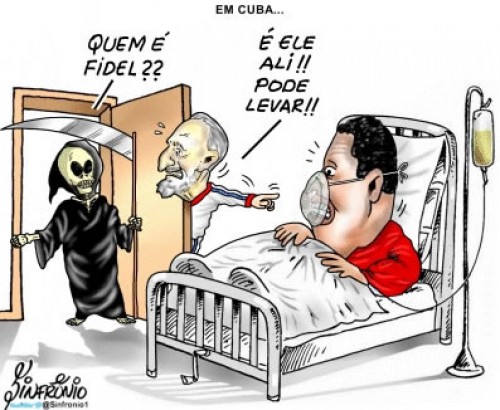El Comandante is Dead: Viva El Comandante
by Orlando Luis Pardo Lazo / January 21, 2013 / No comments
Hugo Chavez’s deteriorating health marks an uncertain future for both Venezuela and Cuba.

'Who is Fidel?' 'That's him there!' Photo courtesy of Sinfronio.
The president of Venezuela, Commander Hugo Chávez, has now undergone surgery in Havana for the fourth time since 2011, when he publicly announced that he had cancer—though exactly when he was diagnosed is a state secret. The Cuban press wouldn’t dare to question such matters.

- Is it worth-while to focus on the last images and letters coming from the inside of the last living utopia on Earth? Is Cuba by now a contemporary country or just another old-fashioned delusion in the middle of Nowhere-America? A Cold-War Northtalgia maybe? Can we expect a young Rewwwolution.cu within that Ancien Régime still known as The Revolution? I would like to provoke more questions than answers.

- Orlando Luis Pardo Lazo was born in Havana City and still resides and resists there, working as a free-lance writer, photographer and blogger. He is the author of Boring Home (2009) and is the editor of the independent opinion and literary e-zine Voces.
Still, Havana cannot afford the fall of Chávez’s Bolivarian government; without Venezuelan subsidies the Cuban Revolution will collapse into a crisis similar to what happened in the nineties when the European Socialists disappeared. That’s why thousands of Cubans work full-time in all spheres of Venezuelan society, while members of Cuba’s secret service form part of the dying Venezuelan president’s advisory and security teams, as well as infiltrate the lines of the country’s opposition. In practice, Havana behaves like the puppet-master pulling the strings of power in Caracas.
Vice-President Nicolás Maduro will be the successor to the Venezuelan populist regime. He is a politician who gives little away, and is feared for his ideology-free pragmatism (in the style of Raúl Castro, while Chávez was a charismatic clone of Fidel Castro). Maduro then, is the ideal candidate to be a long-term puppet for the Cuban government, which financed the Bolivarian Socialist project in its infancy, and will now reap the multi-million-dollar rewards from that investment. (In this we may well see a resurrection of the idea of bi-national political fusion.)
The Cuban people view this scenario with a skeptical knowledge of their history. Nevertheless, as a result of either panic or apathy, they never get involved in their country’s current events. They only hope to be able to escape en masse thanks to the Migration Reform passed in January, which will allow them to travel abroad without the humiliating Entry and Exit Permits. However, if the Island needs more cheap labor in the immediate future due to the stampede of emigration, it can always bring more workers over from its Venezuelan satellite.




